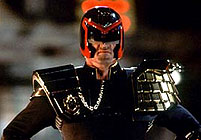|
|
|
|
Judge
Dredd
|
 |
|
In 1987, producer Edward Pressman announced eagerly that he was developing the hottest property around: an adaptation of the cult comic book Judge Dredd. At that time, Tim Hunter – fresh from the critical triumph of River's Edge (1986) – was slated as director. Eight years is a very long time in mainstream cinema. In the meanwhile, Pressman watched as an avalanche of similar projects – particularly the Robocop series – stole the thunder of his novel idea. Futuristic action settings, teeming with feral kids, broken-down buildings and fascistic, robotic law enforcers, quickly became a cliché of A movies, B movies and rock videos alike. Pressman has finally completed his Judge Dredd. However the project was originally conceived, now it is strictly a formula action film, handled proficiently but not particularly inventively by young British director Danny Cannon (The Young Americans, 1993). And it is a typical Sylvester Stallone vehicle, less clever and snappy in many respects than the roughly similar Demolition Man (1993). As in that film, the world of Judge Dredd is one in which anarchy rules, and the crumbling State urges citizens to do economic-rationalist duties such as recycling food. The "judges" are a band of fancifully clad cops who are empowered not only to nab offenders, but also dispense instant justice. The system may appear brutal, but this is not a film trading in moral ambiguities – Stallone as Dredd is presented as the paragon of virtue throughout. The problem for Dredd is twofold: first he is framed and thrown off the force, and secondly he must face his long-lost brother Rico (Armand Assante, giving a fierce performance). There is a mystery surrounding the identity of both these men, and it leads to some listless, philosophical reflection on the film's part about the difference between clones, humans and gods. But Judge Dredd, in this regard, is no Blade Runner (1982). Where Demolition Man was full of amusing satirical details and sharp cameos, this film is leaner and more simplistic. Joan Chen briefly wheels out her Twin Peaks specialty – the sinister, Oriental vixen – and Max von Sydow has a corny role as a wise, benevolent old patriarch. Comic relief, Sancho Panza style, is provided fitfully by Saturday Night Live alumnus Rob Schneider, who at least does a good Stallone imitation. I am not one of those critics who automatically switches into lordly derision mode when confronted with the spectacle of Stallone. He is a talented director, and an actor who truly knows how to use his voice and body for maximum cinematic effect. But Judge Dredd reveals an uncertain Stallone, wavering between camp self-parody and dramatic conviction. Perhaps Stallone would be better off at this point emulating the auteur Clint Eastwood than the hyper-real masculine icon Arnold Schwarzenegger. MORE Stallone: Get Carter (2000), Spy Kids 3D, Daylight, Assassins, Cliffhanger, Tango and Cash MORE Cannon: Goal! © Adrian Martin August 1995 |
![]()